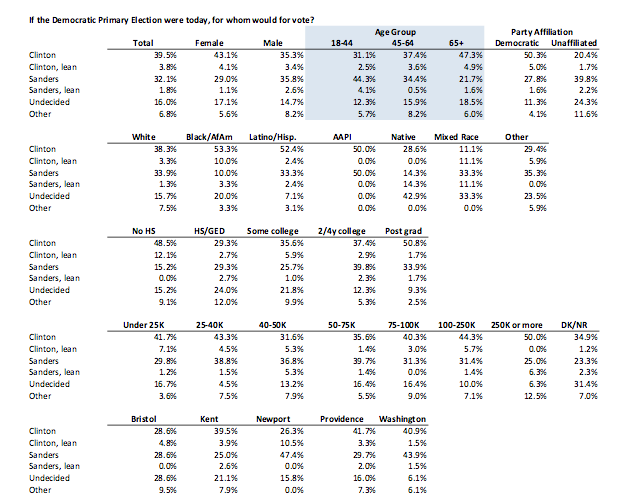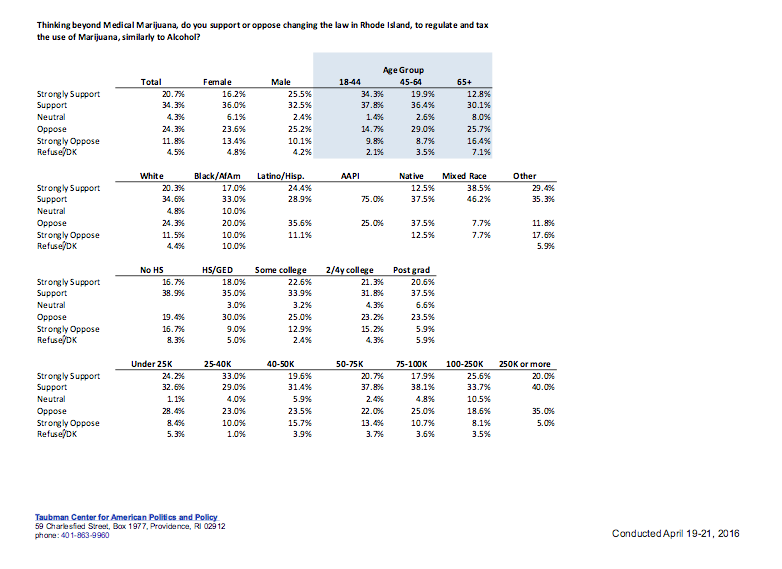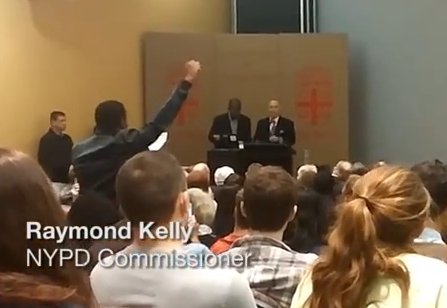Climate change
 The PPP poll of 1,179 likely Rhode Island primary voters found that 53 percent of Rhode Islanders were “much more likely” to “vote for a candidate who believes the United States must do all it can to lessen our dependence on fossil fuels by embracing measures like solar, wind, and renewable fuels, like biofuels,” and 22 percent “somewhat more likely” to support such a candidate. Only 26 percent of Rhode Islanders don’t want to support a climate champion for elected office with 11 percent “somewhat less likely” to support such a candidate, 7 percent were “much less likely” and 8 percent said it wouldn’t make a difference.
The PPP poll of 1,179 likely Rhode Island primary voters found that 53 percent of Rhode Islanders were “much more likely” to “vote for a candidate who believes the United States must do all it can to lessen our dependence on fossil fuels by embracing measures like solar, wind, and renewable fuels, like biofuels,” and 22 percent “somewhat more likely” to support such a candidate. Only 26 percent of Rhode Islanders don’t want to support a climate champion for elected office with 11 percent “somewhat less likely” to support such a candidate, 7 percent were “much less likely” and 8 percent said it wouldn’t make a difference.
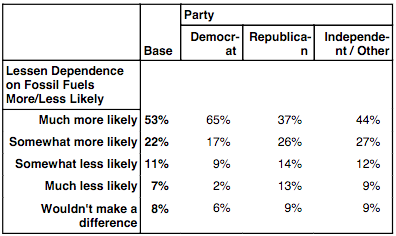 Even a majority of Rhode Island Republicans want to support a climate champion, the PPP poll found. A total of 63 percent of Republicans were more likely to support a candidate who would decrease dependence on fossil fuels, with 37 percent much more likely and 26 percent somewhat more likely. For Republicans, 27 percent were less likely to vote for a candidate who would invest in alternative energy and 10 percent of Democrats.
Even a majority of Rhode Island Republicans want to support a climate champion, the PPP poll found. A total of 63 percent of Republicans were more likely to support a candidate who would decrease dependence on fossil fuels, with 37 percent much more likely and 26 percent somewhat more likely. For Republicans, 27 percent were less likely to vote for a candidate who would invest in alternative energy and 10 percent of Democrats.
The PPP survey parsed its climate change question in terms of fossil fuels contributing to terrorism. It asked: “You may have heard about a connection between fossil fuels and terrorism. Even though the US doesn’t buy oil directly from regimes hostile to us and our allies, our demand for oil does drive up world prices, which benefits hostile regimes. Knowing this, would you be much more likely, somewhat more likely, somewhat less likely, or much less likely to vote for a candidate who believes the United States must do all it can to lessen our dependence on fossil fuels by embracing measures like solar, wind, and renewable fuels, like biofuels?”
Cannabis
The Brown poll posed a more straight-forward question about marijuana. “Thinking beyond medical marijuana, do you support or oppose changing the law in Rhode Island to regulate and tax the use of marijuana, similarly to alcohol,” it asked.
Much of Rhode Island does, with 55 percent answering yes. 21 percent strongly support taxing and regulating cannabis and another 34 percent support it. Only 4 percent were neutral, 24 percent oppose the idea and 12 percent strongly oppose ending prohibition. 5 percent said they didn’t know or refused to answer.
Young Rhode Islanders overwhelmingly want marijuana to be legal, with 72 percent of people age 18 to 44 supporting the idea. Older Rhode Islanders were evenly split with 42.9 percent supporting legalization and 42.1 percent opposed. 56.3 percent of people age 45 to 64 support it and 37.7 percent are opposed.
The poll showed people were more likely to support regulating cannabis like alcohol the more education and income they had.
It also showed that white people were both more likely to support and oppose legalization than black people. 55 percent of white people polled said they support legalization and 36 percent were opposed compared with 50 percent of black respondents who support it and 30 percent who are opposed. Conversely black respondents were more than twice as likely as whites to either refuse to answer or remain neutral.
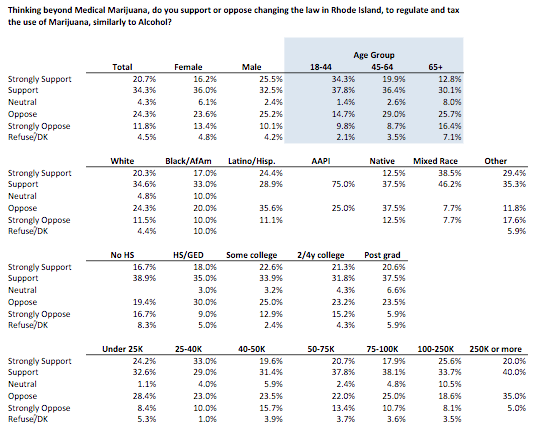
A local poll from Brown University’s Taubman Center for Politics and Policy indicates a slight lead for Hillary Clinton, while the nationally-recognized Public Policy Polling version shows a slight lead for Bernie Sanders. The Taubman Center poll found likely primary voters prefer Clinton to Sanders 43 to 34 percent, with 16 percent undecided. The PPP poll asked only people who intend to vote in the Democratic primary and found Sanders had an advantage, 49 to 45 percent, with 6 percent undecided.
According to the Taubman Center: “Results of the poll are based on a telephone survey of a random sample of 600 registered, likely voters in Rhode Island. The sample included likely voters who identified as Democrat (320), Republican (99) and Unaffiliated (181). Likely voters were defined as anyone who voted in November 2014, September 2014, April 2012, or registered since November 2014. The poll had a overall margin of error of 4 percent. The sample reporting that they would vote in the Democratic primary was 436 with a margin of error of 4.6 percent.” The PPP poll asked 668 likely Democratic primary voters on Friday, Saturday and Sunday.
The Taubman Center found Clinton’s best demographic advantage over Sanders comes from the Black vote (63% to 13%). Sanders does best among unaffiliated voters (42% to 22%).
Read the Taubman Center’s full results here. Other important takeaways: 55 percent of Rhode Islanders want the state to tax and regulate marijuana. Gina Raimondo isn’t very popular, nor are truck tolls. But charter schools and tourism spending are.
]]> With the intention of helping to spruce up the Upper South Providence neighborhood, the Creative Capital recently won a $300,000 ArtPlace America grant.
With the intention of helping to spruce up the Upper South Providence neighborhood, the Creative Capital recently won a $300,000 ArtPlace America grant.
The project, ‘Illuminating Trinity’, will focus on renovating the Grace Church Cemetery and build capacity and programs at Southside Cultural Center.
“We have seen arts and culture transform our city and we know that cultural expression in our neighborhoods is just as important as in downtown,” said Mayor Jorge Elorza. “I am grateful ArtPlace America has decided to join our efforts by helping provide this opportunity to improve Trinity Square.”
The program also will bring to Providence one of two pilot programs, Community Innovation Lab, developed by EmcArts, which integrates art and artists into the process of developing systemic change.
“We’re thrilled to be working alongside Mayor Elorza, RI-LISC, and the other partners to harvest the unique power of local artists and cultural workers to catalyze systemic change,” says Richard Evans, president of EmcArts. “Public safety is a complex problem. It requires questioning old assumptions, collaborating across boundaries, deep understanding of local system dynamics, and rehearsing many potential strategies for change. The Community Innovation Lab framework creates space for high-impact, creative solutions to emerge and builds a robust network of advocates to ensure that those strategies get implemented.”
Other organizations participating include RI Black Storytellers, RI Latino Arts, the Cambodian Society, the Laotian Society, ECAS Theater, and RISD.
AS220 also applied for the same grant. I sat down with AS220 founder Bert Crenca, who shared his thoughts on the topic.
]]>Certainly, the conservatives have a lot to lose in capitulating to the demands of groups like the Providence Student Union (PSU) or the organizers of the Kelly protest. Those with opposing ideas of how society ought to be must confront each other. The more dismal component of these debates and contests however, are those allegedly “progressive” voices, who, from the sidelines of any struggle, use their privileged access to the media to denounce the methods or tactics of organizers. It’s important that this debate between these progressives (and so-called “civil rights leaders”) be settled in favor of an analysis that values justice over civility, promotes the liberation of oppressed people rather than defending the “rights” of oppressors.
So much of the criticism, and in some cases, outright dismissal, of the Providence Student Union (PSU) is focused on their tactics. Caricatured as a “sideshow” and otherwise cheap political theater, the protests and actions of the group seem to be the only thing up for debate in the minds of conservatives and professed “progressives” alike. PSU’s demands to rescind the NECAP standardized test graduation requirement, along with the largely unarticulated contention their work raises – who should decide how and what Providence students learn – don’t seem worthy of consideration. Perhaps the reason we – so conveniently, it seems, for the arguments of the pundits criticizing the PSU – don’t get anywhere with so-called “education reform” is because no one with formal decision-making power actually wants to change the direction we’re heading. More testing, evaluations designed to undermine teachers’ unions, and privatization of everything, from entire schools to busing. The conclusion one is bound to draw from the focus on superficial aspects of the situation – “how” the PSU goes about making its point- is that whomever is pandering this kind of analysis must have some stake in the status quo. No argument over the PSU’s “tactics” will result in change, especially when the context in which the students struggle to find a voice is almost entirely ignored.
Many critics of the PSU would have us believe that the group’s alleged “sideshow” tactics are unnecessary, some going so far as to say they’re just looking for publicity, not even trying to address a social issue. Yet no one seems capable of articulating how these students might otherwise voice their position in regards to NECAP or any other policy of their schools for that matter. Without a proposed alternative, one is forced not only to question what stake these critics might have in keeping things the way they are, but also where the root of their angry response to the Unions “tactics” truly lies. I would argue this ugly root is actually shaped by bigotry based on age, race, and class.
Coupled with a general fear of change (along with the power and paychecks involved) there is a deep undercurrent of hackneyed prejudice to the majority of the criticisms of the PSU. One could imagine, based on her crude comments, that Board of Education chair Mancuso doesn’t believe any 16 year old should have a say in her own education. I suppose she’d rather decide for students, in private meetings, what and how they will learn (and subsequently, how they’ll be valued as workers and adults). In Mancuso’s myopic, white-washed world, perhaps this is enough to try and wrap her mind around. But, because the PSU is based in Providence, because its members are mostly African-American, Latino, South East Asian, because many come from immigrant families, there is a lot more than the chair’s distaste for kids at stake. Though banal arguments about “tactics” obscure (intentionally in most cases), the fact that racism and class privilege are undeniably present in this situation, anyone savvy enough to understand the history and political-economy of public education in this country should not be duped.
Context matters. It matters in any debate over the Union’s demands, and it matters in one-dimensional diatribes about “tactics.” The real questions we ought to be asking ourselves are: should the students of the PSU (and students in general) have a say in how and what they learn? Who and why might someone argue that they shouldn’t? Why would the PSU employ the “tactics” they have? What other options were and are available to them? These questions, unlike the ones being posed in the majority of commentary, might get us closer to the issues underlying the work of the PSU and the roots of the arguments against them.
Based upon the response from policy-makers, school administrators, conservative and progressive commentators, it would seem that no one criticizing the PSU actually believes students (or perhaps these students) should have a voice in their own education. One of the fundamental beliefs that the PSU’s protests challenge is that administrators, far-removed policy hacks, and, increasingly, profit-seeking education corporations and their consultants, ought to decide how and what students learn.
By organizing – a concept it appears few still understand – the students of the Union are part of a long, dynamic history of how change happens in this country. One of the most prominent examples, the gains of which many PSU critics implicitly or even explicitly in some cases, work to roll back, is the Civil Rights Movement. The foundation of that widespread movement for racial justice was organizing, not the idolatry of Martin Luther King – which many of the Union’s “progressive” critics stake their reputations upon. That foundation was laid by the localized, person-to-person work being done, largely uncelebrated, by Black women in the South. Organizing, against the Jim Crow of the mid-20th century American South, or the current Jim Crow system of mass incarceration, police terror, and yes, a deeply racist education system, means opening the moral, political, and physical space for the oppressed to challenge the system of white supremacy and class domination that day-to-day largely tramples on unhindered.
The direction, militancy, and horizons of the Civil Rights Movement came from those without recognized political power, whose dreams of a different life, fueled by their daily experience of white supremacy, made them uncompromising in their struggle for justice and perhaps even revolution. These “common” visionaries, often pushed the limitations of their alleged leaders, driving the movement on to it’s next important strides towards a racially just society. Those who would seek to denounce the students of the PSU, and thus make crucial decisions for them, rather than with them, would do well to take lessons from history. Again, where do these detractor’s ideas about who should run the public education system derive from? From the brutal, white supremacist and capitalist status-quo. They aren’t doing themselves, or any of us for that matter, any favors by seeking to suppress the liberating energies of the Union’s student organizers. They are, as usual, simply lining their own, as well as the usual suspects, never-ending pockets. All in the name of “progressivism,” or even, “civil rights!”
It should be no surprise that the same antagonists who have been moralizing the PSU’s tactics would apply their reactionary logic to the recent protest of New York City police commissioner Ray Kelly. In the alleged defense of free speech, self-proclaimed civil rights leaders (along with, thanks to the Providence Journal, conservative think-tanks) have admonished the student and community organizers who prevented Kelly from speaking at Brown University. That Kelly was heckled off the stage is being called an “uncivil” disruption of his right to speak and the audience’s right to hear him. These detractors claim that the protestor’s would have been better off engaging in “civil discourse,” held up as the backbone of any progressive change.
Two related points need to be made about Kelly’s “rights,” as well as this vague and much-touted concept, civil discourse. Firstly, since when did rights have nothing to do with power? What tradition of civil rights are these alleged spokespeople upholding? Kelly, wielding his control over the policies and practices of the entire New York City police department, has established a system of race-based oppression, intended to generate fear in the people of color of New York. This is the institutionalized, highly-resourced, and undemocratic (he was appointed, no?) power Kelly holds. In this position, he has had ample opportunity, not only to voice his opinion, but to actually put his ideas into practice!
How does Kelly’s power, and subsequently, despite what many commentators would like us to believe, the breadth of his rights, compare to that of the organizers in the crowd? The organizers had no institutional backing whatsoever, except for those small, mainly volunteer-run institutions they had built for themselves. It should be easy enough to see through the straw man about Brown’s “liberal” professors and “culture.” The self-proclaimed “liberals” being touted as the scourge of conservatism on campus are the ones deriding the protestors! It’s certainly not a liberal conspiracy to toss out someone like Kelly. I imagine that if those “unruly” protestors and their ideas were really running things at Brown, we wouldn’t have seen Ray Kelly on campus at all, let alone for a huge honorarium and in a celebratory fashion.
Moreover, these organizers and protestors were, in the majority, people of color – the targets of policies like Ray Kelly’s (which, by the way, have been the norm in Providence for years, the Providence PD simply does not have a nationally recognized, formal policy of racial profiling. They prefer to deny that profiling exists.) Whatever limited power these organizers have, Kelly’s policies are designed to undermine, using near-constant threat of harassment, violence, and incarceration. Though indignant commentators would surely gasp, it’s clear to these organizers (and to those willing to accept the actual history of this country) that Ray Kelly and his policies are buttressed by hundreds of years of colonization, chattel slavery, and systemic racism, while the protestors instead struggle to overcome these bulwarks of American society.
Are we to believe that, given this glaring imbalance of power, Kelly and the protestors would have been on a level playing field had they simply engaged in civil discourse? Asked polite, but “tough” questions at the end of the man’s speech? Wrote patient and explanatory articles in the Brown Daily Herald? What incentive then would there be for Kelly’s policies of stop-and-frisk to be put to an end, either by Kelly himself (presumably after hearing the protestors impassioned, reasoned arguments) or by public opinion (which might, heaven-forbid, empower people in New York City to resist stop-and-frisk…oh wait, that’s already happening!). How easy it is to moralize in a vacuum! How simple-minded to presume, against undeniable evidence, that there is no imbalance of power mediating our rights. Again, like arguments against the tactics of the Providence Student Union, one must ask: is this innocent ignorance, or are those making these claims protecting something, intentionally obscuring reality, admonishing those who rupture the everyday through protest, to suit their own comforts, “rights,” and privileges?
It’s a massive betrayal on the part of anyone claiming to uphold the banner of civil rights to decry protestors (mostly protestors of color!) fighting the representative of a racist police policy, without even a nod to the fact that racism or massive disparities of power and influence exist in our society. Not content to simply obfuscate the reality of race and class power, some have gone further, infantilizing people’s reaction over an “emotional issue” as a substitute for any real analysis of the situation. Surely New York’s stop-and-frisk policy and the long history of racialized terror from which it springs are worthy of more than a plaintive wail about how they must make people feel!
Perhaps this is related to the bastion of liberal problem-solving, civil discourse, which has been tossed about not only as the reason to disdain the protest of Kelly, but as an inviolable pillar of our “tolerant” society. The alleged leaders called upon to comment on the protest are, rather than championing the rights of those terrorized, locked up, and brutalized by Kelly’s policies, defending their favorite straw man: civil discourse. They would have us believe that impatient and crude activists are always assaulting this discourse and preventing real, painless change from occurring. Kelly’s speech sheds light on what this “discourse” ultimately amounts to. The argument goes that the protestors, rather than “silencing” the commissioner, should have politely heard him out, then posed their challenging, yet civil, questions during the established Q & A. The result would have been a genteel and unremarkable event. And those local policy-makers and police, who only want to fight crime more effectively, would have heard their racist views and practices reaffirmed by an exalted cop, maybe steeling them to push “proactive” policing further in Providence. The Brown undergads on the verge of tears for the display of free-speech bashing would not have had to be so traumatized!
Yet, what were the protestors after? A statement. A statement against clearly racist policies. From the initial request to cancel the lecture (and spend the honorarium somewhere more appropriate), student organizers sought a disavowal of Kelly and the type of world he represents – a world that is anything but civil. If the protest made you uncomfortable, made you fret over rights, perhaps you might imagine (if you haven’t already experienced it like so many others) a stop-and-frisk. Or, consider not just an isolated incident, a one-off of humiliation, terror, and potentially life-changing consequences, but a generalized, daily routine of surveillance and random violence – the explicit goal of Kelly’s policies. One would hope that champions of civil rights would view the depravity of institutional racism as more discomforting than the heckling of a university’s honored guest. US racism was, after all, built within the genteel, civilized society of the plantation South. Not exactly a concept that we ought to be touting.
Between the Providence Student Union’s confrontation over the future of the education system and the uncivil discourse of protesting Ray Kelly, it’s clear that comfortable, establishment liberals, like their forbears, simply will not choose sides, despite an increasingly clear war over the direction of our society. It’s moments like these that expose liberalism’s inadequacies of vision and analysis. How can you participate in the struggle for justice if you become squeamish over challenging the speech of the overseer of a racist police system? How can you envision a new society if your inviolable method of change is limited to civil discourse? Who has access to this realm of discourse? Apparently Ray Kelly was welcome, while the “rude” protestors were not. So those directly impoverished, violated, too often even murdered by the systems you and Kelly quietly debate are to sit on the sidelines, face more incarceration, deprivation, and injustice, until a civil solution is worked out by those worthy of the conference room?
It’s long been time for those shielding themselves from the obvious conflict going on by hiding behind civility to declare a side. For the oppressed may not fit your description of civility. Those on the side of the oppressed might, reasonably, take your actions to mean that you have chosen your side – that of the existing system and its elites. Perhaps, despite the fact that it will not be a civil contest, folks have chosen to fight for a fundamental revolution in society, to fight for their rights to imagine, create, and live to achieve their full human potential. To defend the rights of a man like Kelly against the bold and uncivil action of those his policies oppress is to choose Kelly’s side of history, the losing side.
So, stop trying to build careers by placating those with power and influence, stop demanding civility and start demanding justice, and decide which side you plan to fight with. I for one, will follow the leadership of those bold organizers and protestors who heckled Ray Kelly offstage. I will follow them to victory over racism and capitalism, and I will gladly be uncivil doing it.
]]>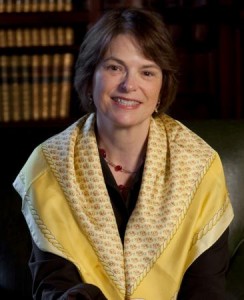
The shout down at Brown has led to the creation of the “Committee on the Events of October 29,” said Brown President Christine Paxson today.
The committee will “identify issues that may have contributed to the disruption” and “address the broader issues of campus climate, free expression, and dialogue across difference,” she wrote.
Paxson authored a critical letter on the night of the incident. In this one she writes, “Making an exception to the principle of open expression jeopardizes the right of every person on this campus to speak freely and engage in open discussion. We must develop and adhere to norms of behavior that recognize the value of protest and acknowledge the imperative of the free exchange of ideas within a university.”
Conversely, Martha Yager of the the American Friends Service Committee, a Quaker organization that promotes “peace with justice … through active nonviolence” wrote an impassioned defense of the activists who shouted down Ray Kelly last week in today’s print edition of the Providence Journal (online version here).
“The students and members of the Providence community refused to be devalued. They refused to accept business as usual,” she wrote. “That act of refusal has forced conversation within Brown, and indeed in the larger community, that has the potential of being life changing and profoundly educational for the community.”
Andrew Tillett-Saks writes that social change only happens when civil discourse and civil disobedience work in tandem.
“The implication that masterful debate is the engine of social progress could not be more historically unfounded,” he writes in this post. “The free flow of ideas and dialogue, by itself, has rarely been enough to generate social progress. It is not that ideas entirely lack social power, but they have never been sufficient in winning concessions from those in power to the oppressed. The eight-hour workday is not a product of an incisive question-and-answer session with American robber barons.”
]]> Every few years, protestors shout down a conservative speaker at an American University. Every few years, rancorous debate ensues. Yet every few years, the warring sides simply yell past one another; the opponents of the ‘shout-down’ uphold the sanctity of ‘free speech’ while the protestors decry the awful ‘real world impact’ of the conservative speaker’s message.
Every few years, protestors shout down a conservative speaker at an American University. Every few years, rancorous debate ensues. Yet every few years, the warring sides simply yell past one another; the opponents of the ‘shout-down’ uphold the sanctity of ‘free speech’ while the protestors decry the awful ‘real world impact’ of the conservative speaker’s message.
In the wake of the Brown University shout-down of Ray Kelly, champion of the NYPD’s racist stop-and-frisk policy and racial profiling in general, the debate has resurfaced. Rather than talking past the anti-protestors’ arguments, they need to be addressed directly. The prototypical argument in denouncing the protestors is not a defense of Ray Kelly’s racism. It is twofold: First, that a free-flowing discourse on the matter will allow all viewpoints to be weighed and justice to inevitably emerge victorious on its merits. Second, that stopping a bigot from speaking in the name of freedom is self-defeating as it devolves our democratic society into tyranny.
The twofold argument against the protestors stems from two central myths of neoliberalism.
The argument for free discourse as the enlightened path to justice ignores that direct action protest is primarily responsible for most of the achievements we would consider ‘progress’ historically (think civil rights, workers’ rights, suffrage, etc.), not the free exchange of ideas. The claim that silencing speech in the name of freedom is self-defeating indulges in the myth of the pre-existence of a free society in which freedom of speech must be preciously safeguarded, while ignoring the woeful shortcomings of freedom of speech in our society which must be addressed before there is anything worth protecting.
Critics of the protest repeatedly denounced direct action in favor of ideological debate as the path to social justice. “It would have been more effective to take part in a discussion rather than flat out refuse to have him speak,” declared one horrified student to the Brown Daily Herald. Similarly, Brown University President Christina Paxson labeled the protest a detrimental “affront to democratic civil society,” and instead advocated “intellectual rigor, careful analysis, and…respectful dialogue and discussion.”
Yet the implication that masterful debate is the engine of social progress could not be more historically unfounded. Only in the fairy tale histories of those interested in discouraging social resistance does ‘respectful dialogue’ play a decisive role in struggles against injustice.
The eight-hour workday is not a product of an incisive question-and-answer session with American robber barons. Rather, hundreds of thousands of workers conducted general strikes during the nineteenth century, marched in the face of military gunfire at Haymarket Square in 1886, and occupied scores of factories in the 1930’s before the eight-hour work day became American law.
Jim Crow was not defeated with the moral suasion of Martin Luther King, Jr.’s speeches. Rather, hundreds of thousands marched on Washington, suffered through imprisonment by racist Southern law enforcement, and repeatedly staged disruptive protests to win basic civil rights.
On a more international scale, Colonialism, that somehow-oft-forgotten tyranny that plagued most of the globe for centuries, did not cease thanks to open academic dialogue. Bloody resistance, from Algeria to Vietnam to Panama to Cuba to Egypt to the Philippines to Cameroon and to many other countries, was the necessary tool that unlocked colonial shackles.
Different specific tactics have worked in different contexts, but one aspect remains constant: The free flow of ideas and dialogue, by itself, has rarely been enough to generate social progress. It is not that ideas entirely lack social power, but they have never been sufficient in winning concessions from those in power to the oppressed. Herein lies neoliberal myth number one—that a liberal free-market society will inexorably and inherently march towards greater freedom. To the contrary, direct action has always proved necessary.
Yet there are many critics of the protestors who do not claim Ray Kelly’s policies can be defeated with sharp debate. Instead, they argue that any protest in the name of freedom which blocks the speech of another is self-defeating, causing more damage to a free society by ‘silencing’ another than any potential positive effect of the protest. The protestors, the argument goes, tack society back to totalitarian days of censorship rather than forward to greater freedom. The protestors, however well intentioned, have pedantically thwarted our cherished liberal democracy by imposing their will on others.
The premise of this argument is neoliberal myth number two—that we live in a society with ‘freedom of speech’ so great it must be protected at all costs. This premise stems from an extremely limited conception of ‘freedom of speech.’ Free speech should not be considered the mere ability to speak freely and inconsequentially in a vacuum, but rather the ability to have one’s voice heard equally. Due to the nature of private media and campaign finance in American society, this ability is woefully lopsided as political and economic barriers abound. Those with money easily have their voices heard through media and politics, those without have no such freedom. There is a certain irony (and garish privilege) of upper-class Ivy Leaguers proclaiming the sanctity of a freedom of speech so contingent upon wealth and political power.
There is an even greater irony that the fight for true freedom of speech, if history is any indicator, must entail more direct action against defenders of the status quo such as Ray Kelly. To denounce such action out of indulgence in the neoliberal myth of a sacrosanct, already existing, freedom of speech is to condemn the millions in this country with no meaningful voice to eternal silence.
Every few years, an advocate of oppression is shouted down. Every few years, the protestors are denounced. They are asked to trust open, ‘civil’ dialogue to stop oppression, despite a historical record of struggle and progress that speaks overwhelmingly to the contrary. They are asked to restrain their protest for freedom so to protect American freedom of speech, despite the undeniable fact that our private media and post-Citizens United political system hear only dollars, not the voices of the masses. Some will claim that both sides have the same goal, freedom, but merely differ on tactics. Yet the historical record is too clear and the growing dysfunctions in our democracy too gross to take any such claims as sincere. In a few years, when protestors shout down another oppressive conservative, we will be forced to lucidly choose which side we are on: The oppressors or the protestors. The status quo or progress.
]]>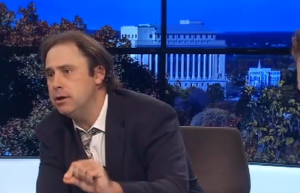 It’s well worth noting that I, for one, was really looking forward to hearing Ray “Stop and Frisk” Kelly defend his deplorable practice of what he calls “proactive policing” earlier this week and I didn’t get to because of the widely-reviled Shoutdown at Brown.
It’s well worth noting that I, for one, was really looking forward to hearing Ray “Stop and Frisk” Kelly defend his deplorable practice of what he calls “proactive policing” earlier this week and I didn’t get to because of the widely-reviled Shoutdown at Brown.
But I don’t believe it is the only thing worth noting about the incident.
Another is there is a fairly large, very ad hoc and relatively politically-powerless coalition of activists in Rhode Island that are extremely fed up with institutionalized racism, or what has been called the new Jim Crow. Public policies like the war on drugs, proactive policing, high stakes testing and voter ID that on their face address social problems and in the process disproportionately target poor and minority populations.
I had the great but thankless honor of defending the agitators/organizers who shouted down Ray Kelly this week on NBC10 News Conference.
Watch the online-only Wingmen segment here, in which me, Bill Rappleye and my made-for-TV-arch nemesis Justin Katz debate the efficacy of such political tactics:
]]>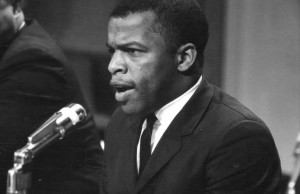 Speaking of civil disobedience, Congressman John Lewis will be in Providence on Friday and I can hardly wait to ask the this living legend of the struggle for civil rights what he thinks of the instantly infamous Shout Down at Brown.
Speaking of civil disobedience, Congressman John Lewis will be in Providence on Friday and I can hardly wait to ask the this living legend of the struggle for civil rights what he thinks of the instantly infamous Shout Down at Brown.
Lewis, like those who prevented Ray Kelly from lecturing on his controversial and currently unconstitutional “stop and frisk” policing style, broke the rules of civil society in an effort to force our nation to have a conversation about racism. He was arrested 40 times during the 60’s, and here’s what I heard him say at the 50th anniversary of the March on Washington:
“…we used what we had to bring about a nonviolent revolution (applause) And I say to all of the young people that you have to push and to pull to make America what America should be for all of us.”
It’s really worth listening to what this icon said just a few weeks ago about civil disobedience:
There are both obvious similarities and differences in how Lewis pushed and pulled for change during the Civil Rights era compared to the direct action successfully coordinated by a surprisingly organized coalition of Brown students and local community organizers. For one, Lewis broke rules he felt were unjust. And when he did interrupt civil society he did so merely with his presence, or his blackness, as the case was.
It’s worth noting that Gandhi’s world-changing Salt March was in tactic more akin to refusing to pay a bridge toll than shouting down an invited guest. But it’s also worth noting that Nelson Mandella was best known for leading a known-terrorist organization, Spear of the Nation, before doing 27 years hard time for other reasons.
There’s no doubt in my mind that nonviolent resistance is a more effective change agent than its morally inferior cousin civil disobedience. But there is also little doubt in my mind that if local activists want Rhode Island to have a discussion about civil rights, playing by the rules will not work. The left has lost serious ground on important issues that smack of latent racism in recent years, such as voter ID and high stakes testing. Both initiatives, like “stop and frisk,” target minority populations and these angles don’t get a fair share of attention in our marketplace of ideas.
Perhaps it’s telling that the Providence Journal’s day 2 story on this Shout Down at Brown does not offer insight from DARE, the Olneyville Neighborhood Association or Fuerza Laboral but it does have perspectives from both the Heritage Foundation and the CATO Institute – two groups that advocate for low taxes and small government, not civil rights or free speech.
In a way, there is a connection between austerity and what Ray Kelly calls “proactive policing.” It places a higher value on efficiency than individual liberty. When that starts happening, and information gatekeepers like the media and academia, don’t want to talk about it, it’s worth forcing the conversation a little bit.
]]>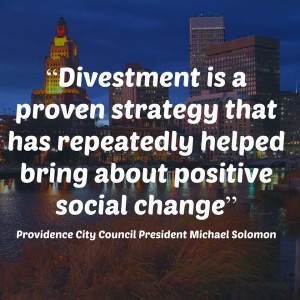 Even though Brown University has decided not to divest from the coal industry, the Capital City is still considering taking its pension investments out of companies that profit from fossil fuels.
Even though Brown University has decided not to divest from the coal industry, the Capital City is still considering taking its pension investments out of companies that profit from fossil fuels.
While Brown decided against divesting about $1 million (or 1 percent of its endowment) from 15 coal companies Sunday, Providence is considering moving more than $10 million of its $283,294 million pension nest egg from 39 fossil fuel companies to more socially responsible funds. What those new funds might be has yet to be determined.
Wainwright Investment Counsel produced this list for the city in August:
Equities
BP ………………………..$1,180,601
Chevron Corp ………..$692,395
Conocophillips ………$479,964
Energen Corp ………..$131,459
Eni Spa …………………$835,907
EQT ……………………..$191,165
Exxon Mobil …………..$646,875
Gdf Suez ………………..$1,244,539
Lukoil ……………………$612,200
Marathon Oil ………….$298,152
Marathon Oil Corp ….$154,712
Marathon Petroleum .$102,295
Mitsubishi ………………$544,447
Noble Energy ………….$143,102
Occidental Petroleum.$59,664
Questar Corp …………..$52,492
Sm Energy ………………$151,550
Southwestern Energy .$196,665
Swift Energy ……………$71,790
Total SA ………………….$1,253,430
Total equities ……..$9.043,403
Fixed income
Alcoa ………………………..$108,665
Anadarko ………………….$118,718
Arcelormittal …………….$18,113
Chesapeake ………………$152,600
Continental ………………$58,350
Encana Corp …………….$123,921
Newfield Exploration ..$108,150
Occidental Petroleum ..$240,890
Peabody Energy ………..$76,688
Petrobras ………………….$189,128
Questar Corp …………….$145,636
Rio Tinto ………………….$129,038
Rio Tinto ………………….$88,621
Sm Energy ………………..$15,900
Statoil Asa ………………..$160,545
Teck Resources …………$5,100
Teck Resources …………$117,627
Total ………………………..$1,857,689
]]>
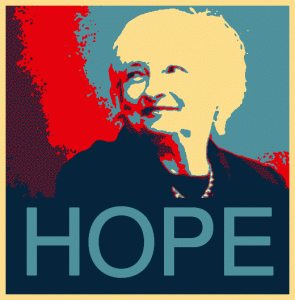 Not only should progressives be happy with President Obama’s choice of Janet Yellen to chair the Federal Reserve, so should all Rhode Islanders. She’s not only a Keynesian economist, she’s also a 1967 graduate of Brown University, tweets her alma mater.
Not only should progressives be happy with President Obama’s choice of Janet Yellen to chair the Federal Reserve, so should all Rhode Islanders. She’s not only a Keynesian economist, she’s also a 1967 graduate of Brown University, tweets her alma mater.
And, it turns out that Yellen was a lefty even before enrolling at Brown. According to Business Insider, a high school classmate described her as “a classic ’60s liberal. She has great faith in education as an answer to a lot of societal problems.”
As for her policies and priorities, the Wall Street Journal reports she “focused much of her academic research on the costs and causes of unemployment, has consistently called for the Fed to respond forcefully to high joblessness” and “she said the Fed might need to require the nation’s largest, most complex banks to carry even fatter capital cushions against losses than required by new rules set out by international regulators, a prospect hotly contested by big U.S. banks.”
Sounds pretty good to me. Even better, here’s what the New Yorker wrote about her policies in April:
In a field noted for its conservatism and adherence to free-market orthodoxy, she has long stood out as a lively and liberal thinker who resisted the rightward shift that many of her colleagues took in the eighties and nineties.
And last but certainly not least, here’s what our own progressive Senator Sheldon Whitehouse said about her nomination:
“Janet Yellen is highly qualified to serve as our next Fed chair, and I look forward to supporting her nomination in the Senate. At a time when our economy is still struggling, Ms. Yellen will bring the right priorities, and a lifetime of experience, to help us create jobs and provide a fair deal to the middle class.”
]]>
